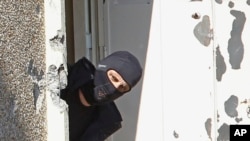The shooting Wednesday in Paris at the French satirical magazine Charlie Hebdo that had published cartoons of the Muslim Prophet Muhammad is the most deadly, but only the latest, outburst of Islamic terrorism in France in recent years. France has been a frequent target of Islamic extremist terror.
At the end of 2014 the French prime minister said France had never faced a greater terror threat. Since the summer of 2013, according to French police, five terror plots had been thwarted.
Durham University international security expert Shaun Gregory says France is at the forefront of Islamist terror in Europe, and has been for decades.
“To find an attack of this scale you have to go back to the mid-1990s when France was subject to the first wave of Islamic terror in Europe. A wave of Islamic terror that presaged 9/11 and all that followed," Gregory said.
In 1995, a bomb exploded on a commuter train in Paris, killing eight people and injuring more than 100. That was one of several attacks attributed to Algerian extremists. The following year another bomb exploded on the same train line, killing four people and wounding nearly 100.
Gregory says after the mid-90s the violence subdued. In part, he says, because of the political climate: France did not originally enter the war in Iraq in 2003, and instead tried to create space between itself and Europe and its NATO allies.
But in recent years the terror threat has risen again. Europol statistics from last year show that there were more than 500 terrorism incidents across Europe, almost half in France and 40 percent of terrorism-related arrests were made in France.
The same periodical targeted Wednesday, Charlie Hebdo, had been attacked before. In 2011 its offices were damaged by a firebomb thrown through the window a day after it printed a caricature of the Prophet Muhammad.
Gregory says the re-emergence of the Islamic terror threat may partly be explained by shifting political policy.
“France participated in the stabilization mission in Afghanistan. It began to take an increased role in North Africa and in the instability there in Libya and Morocco. And also of course the operations in Mali in 2012, 2014," he said.
France has western Europe’s largest Muslim population, estimated at around five million.
Gregory says perceived French attitudes and policies towards that Muslim community have contributed to the problem. For example, the banning of full-face veils in public and headscarves in state schools.
“At the same time a perception of increased pressure on the Muslim community within France as a result of the French state trying to maintain its insistence on secularism and on the exclusion of religious symbols from the public space," he said. "These things have come together to put France back on the frontline of terrorism in Europe."
According to Interior Ministry figures, nearly 400 French nationals are fighting with jihadist groups in Syria and Iraq, while several hundred more are thought to be preparing to leave. Around 200 have returned to France, where they are awaiting trial.
Terrorism expert Bill Tupman from Exeter University says the political climate in France is such that the Charlie Hebdo attack will have a major impact on the political and social landscape.
“[In] previous situations the political support for the far-right has been quite low," he said. "At present, like in the rest of Europe, support for the far right, for anti-immigration moves, for anti-multiculturalism, for national identity, is much stronger than it ever has been before in Europe."
He says Wednesday’s killings are likely to boost anti-Muslim sentiment.




